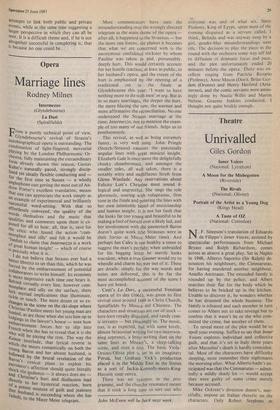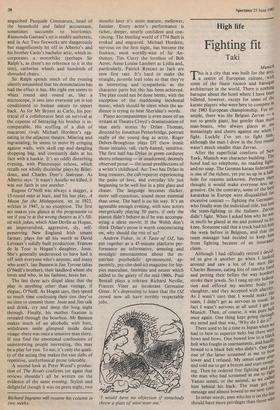Theatre
Unrivalled
Giles Gordon
Inner Voices (National: Lyttelton) A Moon for the Misbegotten (Riverside) The Rivals (National: Olivier) Portrait of the Artist as a Young Dog (Kings Head) A Taste of OZ (National: Cottesloe)
N. F. Simpson's translation of Eduardo de Filippo's Inner Voices, assisted by spectacular performances from Michael Bryant and Ralph Richardson, comes across as almost a great play. Set in Naples in 1948, Alberto Saporito (Sir Ralph) de- nounces his neighbours, the Cimmarutas, for having murdered another neighbour, Aniello Amitrano. The extended family is rounded up by the police, and Albert searches their flat for the body which he believes to be bricked up in the kitchen. Unable to discover it, he wonders whether he has dreamed the whole business. The family is released and each member in turn comes to Albert not to take revenge but to confess that it wasn't he or she who com- mitted the crime, but another of them.
To reveal more of the plot would be to spoil your evening. Suffice to say that Inner Voices explores individual and collective guilt, and that it's set in Italy three years after Mussolini's death is hardly coinciden- tal. Most of the characters have difficulty sleeping, most remember their nightmares the morning after. What Alberto hadn't an- ticipated was that the Cimmarutas — admit- tedly a mildly shady lot — would accept they were guilty of some crime merely because accused.
Mike Ockrent's direction doesn't, mer- cifully, impose an Italian rhetoric on the characters. Only Robert Stephens as anguished Pasquale Cimmaruta, head of the household and failed accountant, sometimes succumbs to histrionics. Raimonda Gaetani's set is seedily authentic, and in Act Two fireworks are dangerously but magnificently let off in Alberto's and his brother Carlo's bachelor attic, which in- corporates a motorbike (perhaps Sir Ralph's, as there's no reference to it in the text), catherine wheels and hundreds of shrouded chairs.
Sir Ralph spends much of the evening silently astonished that his denunciation has had the effect it has. His right eye seems to whizz round and round as, like a microscope, it sees into everyone yet is too conditioned to human nature to report back. As for Mr BrYant as Carlo, his por- trayal of a collaborator bent on survival at the expense of betraying his brother is in- comparable. His scoffing of a dish of macaroni rivals Michael Hordern's egg- eating in the adjacent theatre. Mincing and ingratiating, he seems to move by cringing against walls, with skull cap and dangling shopping bag, and constantly dabs at his face with a hankie. It's an oddly disturbing evening, with Pinteresque echoes, which recalls not wholly dissimilar plays by Billet- doux, and Charles Dyer's Staircase. As Alberto says: 'It wasn't Aniello we killed, it was our faith in one another.'
Eugene O'Neill was always a slugger, a 15-round man at least, and his last play, A Moon for the Misbegotten, set in 1923, written in 1947, is no exception. The first act makes you glance at the programme to see if you're at the wrong theatre as it's fill- ed with jokes, which Alan Devlin as Hogan, an impoverished, aggressive, sly, self- preserving New England Irish tenant farmer, plays for all his worth in David Leveaux's solidly built production. Frances de la Tour is Hogan's daughter, Josie. She's generally understood to have had it off with everyone who's anyone, and many who aren't. Ian Bannen is Jim Tyrone (alias O'Neill's brother), their landlord whom she loves and who, in his fashion, loves her.
The last three acts dispel ideas that the play is anything other than vintage, if elegiac, O'Neill. As Hogan says, they spend so much time confessing their sins they've no time to commit them. Josie and Jim talk and drink, cry and sleep. the long night through. Finally, his mother fixation is revealed through the bourbon. Mr Batmen makes much of an alcoholic with hurt, withdrawn smile glimpsed inside dead visage: there was once a sensitive man there. If you find the emotional confessions of uninteresting people interesting, this may be a play for you. To me, it's only the quali- ty of the acting that makes the vast slabs of repetitive, unrhythmical prose tolerable.
A second look at Peter Wood's produc- tion of The Rivals confirms yet again that reviews shouldn't all be written on the evidence of the same evening. Stylish and delightful though it was on press night, two
months later it's more mature, mellower, funnier. Every actor's performance is richer, deeper, utterly confident and con- vincing. The bustling world of 1774 Bath is evoked and engraved. Michael Hordern, nervous on the first night, has become the fruitiest, most worldly-wise of Sir An- thonys, Tim Curry the loveliest of Bob Acres. Anne Louise Lambert as Lydia and, particularly, Patrick Ryecart as Jack are now first rate. It's hard to make the straight, juvenile lead roles so that they're as interesting and sympathetic as the character parts but this has been achieved. The play could not be done better, with the exception of the maddening incidental music, which should be silent when the au- dience is trying to hear Sheridan's words.
Piano accompaniment is even more of an irritant at Theatre Clwyd's dramatisation of nine early stories by Dylan Thomas, directed by Jonathan Petherbridge, portrait really of the young dog as artist. Roger Delves-Broughton plays DT (how ironic those initials), tall, curly-haired, sensitive. The first half has Dylan in green corduroy shorts rehearsing — in unadorned, decently observed prose — the usual predilections of a writer's childhood. Act Two has Dylan in long trousers, the cub reporter experiencing the pains of love, and everyday life just beginning to be well lost in a pint glass and chaser. The language becomes thicker, more self-conscious, sound more essential than sense. The bard is on his way. It's an agreeable enough evening, with nine actors energetically playing 50 parts, if only the pianist didn't behave as if he was accompa- nying a silent movie. If the Welsh don't think Dylan's prose is worth concentrating on, why should the rest of us?
Andrew Fisher, in A Taste of OZ, has put together as a 45-minute platform per- formance an informative, amusing and nostalgic entertainment about the ex- patriate psychedelic (pronounced, ap- parently, psy-che-deal-ic) magazine for hip- pies masculine, feminine and neuter which added to the gaiety of the mid-1960s. Paul Bentall plays a tolerant Richard Neville, Frances Viner an intolerant Germaine Greer. It's depressing to learn that the OZ crowd now all have terribly respectable jobs.
`I would have no objection if somebody threw a glass of wine over me.'



















































 Previous page
Previous page